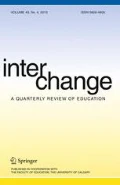Abstract
This paper aims to clarify three current misconceptions about the Islamic faith and issues of human rights and women’s rights in the West. The first misconception is that Muslims are terrorists because they believe in Jihad. It is factually the case that Islamic teachings stress the value of peace and prosperity for all human beings. The second misconception is that Muslims prohibit scientific knowledge and only aim to seek religious knowledge. To the contrary, Qur’an emphasizes that the opportunity to seek all forms of knowledge is a human right and responsibility of all Muslims. The third misconception and perhaps, the most controversial, is that Islam oppresses women. In reality, Islam offers women the right to make their own choices in the areas of education, business, and property, to name a few. By sharing my own experiential narrative as a Muslim born woman and that of a Canadian women who converted to Islam, I can actually see the similarities between human rights in Islam and the United Nation’s Universal Declaration of Human Rights (1948).
Similar content being viewed by others
References
Ashraf S.E. (1978). A critical exposition of Iqbal’s philosophy. Associated Book Agency, Patna, India
Badawi J. (1995). Gender equity in Islam: Basic principles. American Trust Publications, Plainfield, IN
Badawi, J. (n.d.). Gender equity in Islam. Retrieved April 25th, 2005 from http://www.jannah.org/genderequity/equitychap3.html
Progler J. (2001). Norms and allegiances in Muslim education. In: Steinberg, S.R. (eds) Multi/Intercultural Conversations, pp 549–565. Peter Lang, New York, NY
Prophet Muhammad’s Last Sermon. (n.d). Retrieved April 25th, 2005, from http://www.quraan.com/index.aspx
Said E. (1997). Covering Islam: How the media and the experts determine how we see the rest of the world. Vintage Books, New York, NY
Tanveer K. (2000). In search of truth. Da’Wah Highlights 11(8): 29–36
Universal Declaration of Human Rights. (1948-1998). Retrieved May 2nd, 2005, from http://www.un.org/Overview/rights.html
World Bank. (n.d.). Millennium development goals: Promote gender equality. Retrieved April 29th, 2005 from http://ddp-ext.worldbank.org/ext/MDG/gdmis.do
Author information
Authors and Affiliations
Corresponding author
Rights and permissions
About this article
Cite this article
Syed, K.T. Misconceptions About Human Rights and Women’s Rights in Islam. Interchange 39, 245–257 (2008). https://doi.org/10.1007/s10780-008-9062-3
Published:
Issue Date:
DOI: https://doi.org/10.1007/s10780-008-9062-3




